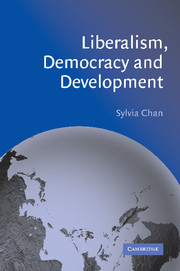Book contents
- Frontmatter
- Contents
- Acknowledgements
- List of abbreviations
- Introduction
- 1 The question: is ‘liberal democracy’ good for economic development?
- Part I The present context of democratisation and decomposing ‘liberal democracy’
- Part II The democracy–development debate: old problem, new thinking
- Bibliography
- Index
Part II - The democracy–development debate: old problem, new thinking
Published online by Cambridge University Press: 22 September 2009
- Frontmatter
- Contents
- Acknowledgements
- List of abbreviations
- Introduction
- 1 The question: is ‘liberal democracy’ good for economic development?
- Part I The present context of democratisation and decomposing ‘liberal democracy’
- Part II The democracy–development debate: old problem, new thinking
- Bibliography
- Index
Summary
Having in Part I developed a framework for understanding ‘liberal democracy’ and explored the questions thrown up during democratisation processes about what ‘liberal democracy’ means and how and/or why a particular democratisation can be sustained on the one hand and/or result in a particular type of ‘liberal democracy’ on the other, we can now apply these conceptual tools to explore how this may help us gain a better understanding of the democracy–development relationship. In chapter 4, the methodology adopted in Part II of this study in the explanation of the democracy–development connection will be explicated. It first lays out the problems with using cross-national, quantitative studies. Then the question of how to construct explanations in the social sciences is explored. It is stressed how explanations are limited, and how the implicit and explicit comparisons and qualifications to social scientific inquiry must be laid out. Section 4.3 then adds to a discussion that started in section 1.1, which focused on the context in which the democracy–development question is asked (section 1.1), and in section 1.4, where the relevance of the Asian experience to this context was explained. In light of the more specific methodological issues raised in sections 4.1 and 4.2, and in light of these two earlier discussions, a more detailed exposition of the reasons for asking the particular questions in the context of the particular cases, the cases of Japan and the Asian NICs, is addressed in 4.3.
- Type
- Chapter
- Information
- Liberalism, Democracy and Development , pp. 113 - 116Publisher: Cambridge University PressPrint publication year: 2002

